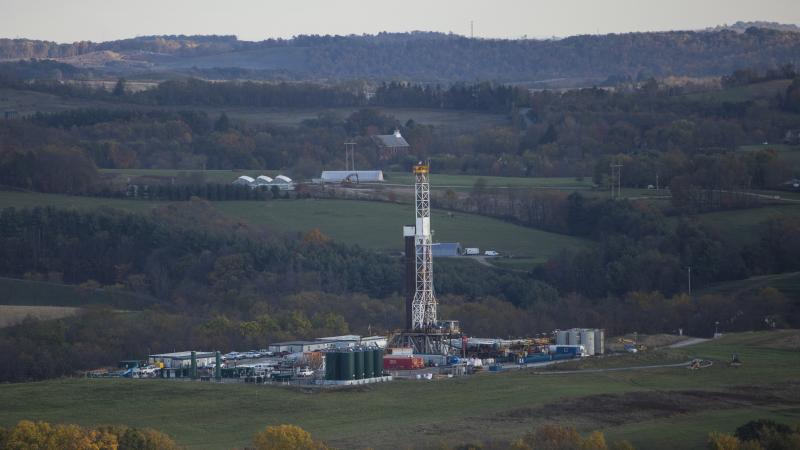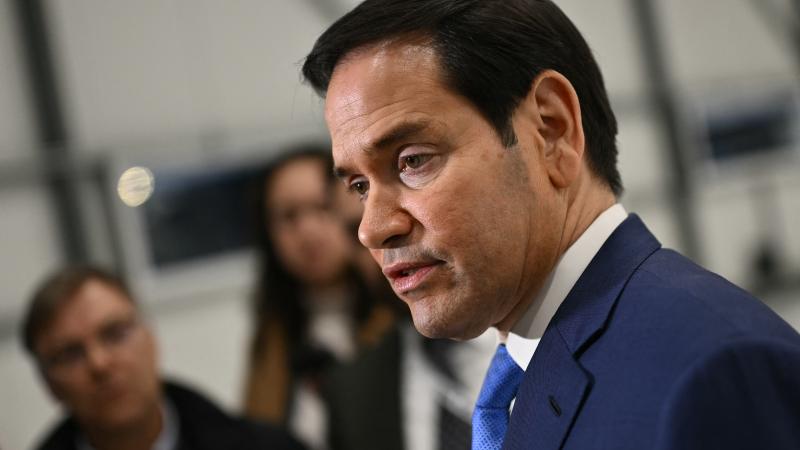Associated Press presents EPA proposal to repeal Biden power plant rules as denying climate change
The proposal states that “emissions from fossil fuel-fired power plants do not contribute significantly to dangerous air pollution.’’ Experts the Associated Press quoted appear to believe this states "emissions have no impact on climate."
The Environmental Protection Agency announced a proposed rule this week that would repeal the Biden-Harris administration’s 2024 emissions and pollution standards impacting power plants.
The proposed rule is open for public comment, and agency Administrator Lee Zeldin encouraged interested organizations and individuals to engage in the process.
He stressed that if finalized the rule would only remove new standards that the previous administration put in place. In other words, Zeldin explained, power plants in operation today would still be governed by pre-2024 regulations, and so they couldn’t emit any more pollutants than they do today. He appeared to anticipate that, despite this point, the media would mispresent the rule as an end to pollution standards.
“I apologize if I just killed some of the pre-written headlines,” he said Wednesday in announcing the proposed rule.
While many media outlets raised the alarm over the proposed repeal, the Associated Press's reporting appeared to suggest the proposed rule denied that climate change exists at all.
‘Regulate them out of existence’
One Biden-era rule that the EPA is targeting for repeal requires that coal-fired power plants operating beyond 2032 must be fitted with carbon-capture technology by 2032. Most new natural gas-fired power plants would have to be fitted with the technology by 2032. The other proposal would repeal stringent limits on mercury and other pollutants emitted primarily from coal plants.
Because carbon capture is expensive and ineffective, experts have argued that the power plant rule would increase retirements of coal plants and make construction of new natural-gas fired power plants prohibitively expensive, which would leave the U.S. power grid reliant on intermittent wind and solar. This would, they argue, increase energy costs and destabilize the nation’s grid.
In the press conference announcing the rule, Zeldin argued the Trump administration seeks to balance protecting the environment with growing the economy.
“Especially over the course of the last couple of years, in 2023 and 2024, rules were enacted seeking to suffocate our economy in order to protect the environment, seeking to make all sorts of industries, including coal and more, disappear — regulate them out of existence,” Zeldin said.
'Doesn't contribute' becomes 'doesn't impact climate'
The Associated Press moved a story after the press conference under the headline, “EPA says power plant carbon emissions aren’t dangerous. We asked 30 scientists: Here’s what they say.” The first paragraph clarifies what the proposed rule says, which is that “emissions from fossil fuel-fired power plants do not contribute significantly to dangerous air pollution.’’
The article states that the Associated Press climate reporter Seth Borenstein asked “30 different scientists in climate, health and economics about the scientific reality behind the proposal.”
Borenstein did not provide a list of the 30 scientists whom he questioned, so it’s not clear what their backgrounds are or with which groups they’re associated.
The article quotes, among others, climate scientist Zeke Hausfather, equating the language of the proposal to “saying that smoking doesn’t cause lung cancer.” Hausfather then explains that the relationship between greenhouse gas emissions and global temperatures is well established in the scientific community.
“It is utterly nonsensical to say that carbon emissions from power plants do not contribute significantly to climate change,” Hausfather told the Associated Press.
The rule doesn’t in any way dispute that carbon dioxide emissions impact the climate. It appears Hausfather was under the impression that the proposal does dispute this. It’s not clear whether Borenstein’s questions gave this impression, or whether Hausfather was responding according to his own understanding of the rule.
Breathing carbon dioxide compared to taking arsenic
However, other scientists Borenstein quotes also appear to have this same misunderstanding, including celebrity climate scientist Dr. Michael Mann.
“It’s about as valid as saying that arsenic is not a dangerous substance to consume,” Mann told the outlet. How emitting carbon dioxide, which stimulates plant growth and that people breathe every day, is comparable to taking arsenic, Mann doesn’t explain.
Mann and his lawyers were recently sanctioned by a D.C. court. Mann had filed a defamation suit against two bloggers, for which he was originally awarded $1 million. A judge reduced the award and accused Mann and his lawyers of making false statements regarding grant losses that Mann claimed resulted from the defamatory statements. Mann is appealing the decision.
Just the News reached out to the Associated Press corporate communications division to get clarification on where the misunderstanding of the proposal’s language arose.
“Thanks for checking. We stand by the reporting,” Patrick Maks, director of media relations and corporate communications for the Associated Press, said.
Just the News also reached out to Hausfather through Berkeley Earth, where he’s a climate science contributor, but didn’t receive a response.
In 2022, the Associated Press received $8 million from net-zero political advocacy groups, including the Rockefeller Foundation, Quadrivarium, and the William and Flora Hewlett Foundation. The funding went directly in support of the Associated Press’ climate and energy coverage. The outlet says that the funding has no impact on its coverage, and that it retains full editorial control.
Defining ‘significantly’ and ‘dangerous’
The statement in the proposed rule that fossil-fuel-fired power plants don’t contribute “significantly to dangerous air pollution” relates to Section 101 of the Clean Air Act, which asks the EPA to determine if a stationary source “contributes significantly to air pollution which may reasonably be anticipated to endanger public health or welfare.” This has been the basis for previous EPA administration’s restrictions on power plant emissions.
While the Associated Press only quotes scientists who support the proposition that climate change is dangerous, experts like Dr. Judith Curry, president and co-owner of Climate Forecast Applications Network, argue that there’s a lot of uncertainty in how climate change will play out and how much of a risk it will pose over the coming century.
The number of deaths from climate-related natural disasters has plummeted 98% since 1920, and there’s no evidence this trend is reversing. The normalized cost of natural disasters has declined. Many indicators of human progress, including crop yields, life expectancy and infant mortality, have improved dramatically, despite claims that the world is in the midst of a “climate crisis.”
Likewise, it’s not clear that Biden’s EPA ever expected that carbon capture would allow fossil-fuel power plants to continue operating. In developing the power plant emissions standards, the EPA had sought comments from Energy Department engineers on whether the technology had been adequately demonstrated, and these comments appeared to be scrubbed from the record.
Likewise, the EPA’s own modeling showed the technology wouldn’t be deployed on any new power plants through 2055. Should the rule be enforced, the grid will have to rely almost entirely on intermittent wind, solar and batteries.
It’s unclear that the Biden administration’s restrictions on power plant emissions, even if they are instituted, would have any effect on climate change. A study by the Texas Public Policy Foundation estimated that U.S. power plant emissions will increase global temperatures by 0.015 degrees Celsius by 2050.
Sen. Kevin Cramer, R-N.D., pointed out at the press conference that emissions from U.S. coal-fired power plants account for 0.4% of global emissions, and natural gas-fired power plants account for 0.28% of global emissions. Meanwhile, developing countries, including China, are rapidly increasing their use of coal.
“So we want to bankrupt an entire industry that would then add to the cost of everything else we want to produce and grow and develop in this country, putting us at a global disadvantage economically, for 0.4%, while we just give license to the polluters of the world?” Cramer asked.
The Facts Inside Our Reporter's Notebook
Links
- announced Wednesday a proposed rule
- many media outlets
- raised the alarm
- over the proposed repeal
- One Biden-era rule that the EPA is targeting for repeal
- The other proposal
- increase energy costs and destabilize the nation's grid
- In a press conference
- Associated Press ran an article under the headline,
- Zeke Hausfather
- recently sanctioned by a D.C. court
- for which he was originally awarded $1 million
- accused Mann and his lawyers of making false statements
- appealing the decision
- Associated Press received $8 million
- Rockefeller Foundation
- Quadrivarium
- William and Flora Hewlett Foundation
- Section 101 of the Clean Air Act,
- Climate Forecast Applications Network
- lot of uncertainty in how climate change will play out
- plummeted 98% since 1920
- natural disasters has declined
- crop yields
- life expectancy
- infant mortality
- comments disappeared from the record
- own modeling showed the technology
- study by the Texas Public Policy Foundation
- including China
- give license to the polluters of the world















